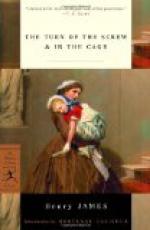said, with all sorts; and it was at the worst a race
for her—a race even in the dull months—from
one set of chambers to another. And then, after
all, there were also still the ladies; the ladies
of stockbroking circles were perpetually up and down.
They were not quite perhaps Mrs. Bubb or Lady Ventnor;
but you couldn’t tell the difference unless you
quarrelled with them, and then you knew it only by
their making-up sooner. These ladies formed
the branch of her subject on which she most swayed
in the breeze; to that degree that her confidant had
ended with an inference or two tending to banish regret
for opportunities not embraced. There were indeed
tea-gowns that Mrs. Jordan described—but
tea-gowns were not the whole of respectability, and
it was odd that a clergyman’s widow should sometimes
speak as if she almost thought so. She came back,
it was true, unfailingly to Lord Rye, never, evidently,
quite losing sight of him even on the longest excursions.
That he was kindness itself had become in fact the
very moral it all pointed—pointed in strange
flashes of the poor woman’s nearsighted eyes.
She launched at her young friend portentous looks,
solemn heralds of some extraordinary communication.
The communication itself, from week to week, hung
fire; but it was to the facts over which it hovered
that she owed her power of going on. “They
are, in one way and another,” she often emphasised,
“a tower of strength”; and as the allusion
was to the aristocracy the girl could quite wonder
why, if they were so in “one way,” they
should require to be so in two. She thoroughly
knew, however, how many ways Mrs. Jordan counted in.
It all meant simply that her fate was pressing her
close. If that fate was to be sealed at the
matrimonial altar it was perhaps not remarkable that
she shouldn’t come all at once to the scratch
of overwhelming a mere telegraphist. It would
necessarily present to such a person a prospect of
regretful sacrifice. Lord Rye—if it
was Lord Rye—wouldn’t be “kind”
to a nonentity of that sort, even though people quite
as good had been.
One Sunday afternoon in November they went, by arrangement,
to church together; after which—on the
inspiration of the moment the arrangement had not
included it—they proceeded to Mrs. Jordan’s
lodging in the region of Maida Vale. She had
raved to her friend about her service of predilection;
she was excessively “high,” and had more
than once wished to introduce the girl to the same
comfort and privilege. There was a thick brown
fog and Maida Vale tasted of acrid smoke; but they
had been sitting among chants and incense and wonderful
music, during which, though the effect of such things
on her mind was great, our young lady had indulged
in a series of reflexions but indirectly related to
them. One of these was the result of Mrs. Jordan’s
having said to her on the way, and with a certain
fine significance, that Lord Rye had been for some
time in town. She had spoken as if it were a




